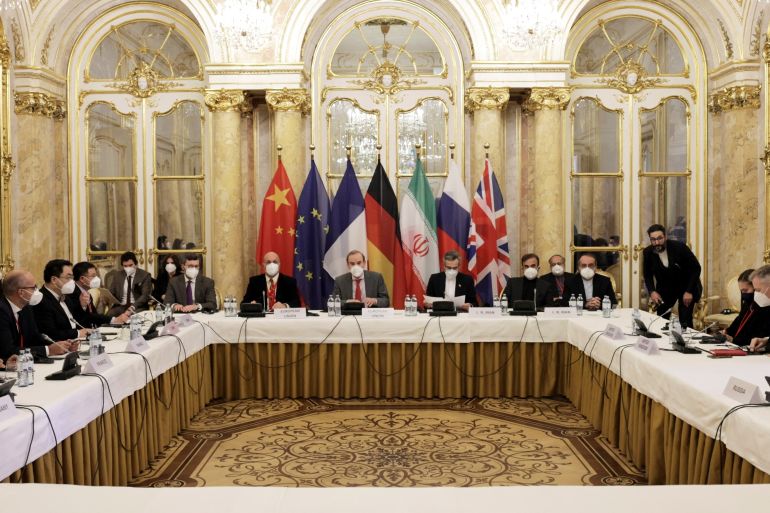Iran nuclear talks to resume ‘soon’ after modest gains in Vienna
Negotiators trying to agree on a joint text that would act as the basis for a potential agreement.

The seventh round of talks in Vienna to restore Iran’s 2015 nuclear deal has ended and while it appears progress was made, the negotiating world powers are not close to an agreement.
A Joint Commission meeting of the remaining signatories of the deal the United States abandoned in 2018 was held in Palais Coburg on Friday.
Keep reading
list of 3 itemsRafael Grossi: Does the UN’s nuclear watchdog trust Iran?
US delegation to head to Vienna for indirect Iran nuclear talks
The delegations are expected to head back to the Austrian capital in about a week with an aim to move forward on restoring the Joint Comprehensive Plan of Action (JCPOA).
“We don’t have months but rather weeks to reach an agreement,” the European Union’s coordinator of the talks, Enrique Mora, told a press conference following the meeting on Friday.
“There’s a sense of urgency that’s absolutely important if we want to really have success in these negotiations.”
Russia’s chief negotiator, Mikhail Ulyanov, said in a tweet that talks will resume “soon”, adding that the latest round of the negotiations “was successful in a sense that it prepared sound basis for more intensive negotiations”.
The seventh round of the #ViennaTalks was successful in a sense that it prepared sound basis for more intensive negotiations. It is fully confirmed that further work will be based on the results of the previous rounds. The negotiators now much better understand each other.
— Mikhail Ulyanov (@Amb_Ulyanov) December 17, 2021
Reports indicate the sides are close to reaching a new joint draft, incorporating elements from a text reached by the end of the sixth round in June and new proposals, by the administration of President Ebrahim Raisi, presented in the form of two documents earlier this month.
If Iran, China, Russia, France, Germany, and the United Kingdom – plus the US which is participating indirectly – agree on a draft, it would act as a basis for moving the talks forward.
Prior to Friday’s meeting, Iran’s chief negotiator, Ali Bagheri Kani, said in a tweet that “good progress” was made during the week and an eighth round will be held after a short break.
Iran has said it wants all sanctions, imposed as part of the “maximum pressure” campaign by the US, lifted, a position the Western counterparts regard as maximalist.
Iran also wants a period to verify the lifting of sanctions, and guarantees the US will not renege on the accord again – demands that it wishes to present as part of a third text when the initial two are agreed upon.
Nuclear developments
The Western signatories of the nuclear deal have repeatedly sought urgency due to Iran’s nuclear advances.
In a joint statement last week, senior diplomats from the so-called E3 said “without swift progress, in light of Iran’s fast-forwarding of its nuclear programme, the JCPOA will soon become an empty shell”.
Following Friday’s meeting, E3 diplomats said in a statement that “there has been some technical progress in the last 24 hours, but this only takes us back nearer to where the talks stood in June”.
They also said all the participants wished to continue the talks, but Iran’s negotiator called for the short pause.
Iran, which maintains that its nuclear programme is peaceful, says the only way the Western counterparts can have their concerns fully alleviated is to lift sanctions.
Iran is now using advanced centrifuges, has limited nuclear inspections, and is enriching uranium up to 60 percent following the US withdrawal.
But the International Atomic Energy Agency (IAEA) has confirmed that it is not attempting the 90 percent enrichment required for a bomb.
On Wednesday, Iran agreed that the nuclear watchdog would be allowed back in a contested centrifuge parts manufacturing workshop in Karaj to replace cameras that were damaged or destroyed in a June sabotage attack that it blamed on Israel.
The move was seen as a positive development for the Vienna talks that put to rest the possibility of an extraordinary meeting of the IAEA Board of Governors.
But in a press conference on Friday, IAEA Director General Rafael Grossi said the agency still wants answers on the missing recording of one of four cameras that was destroyed in the attack.
The official said that “we have ways to try to reconcile the facts on the ground with what Iran is going to be telling us soon”.